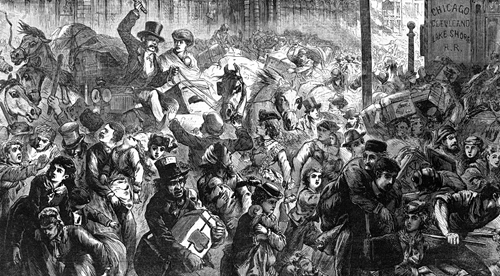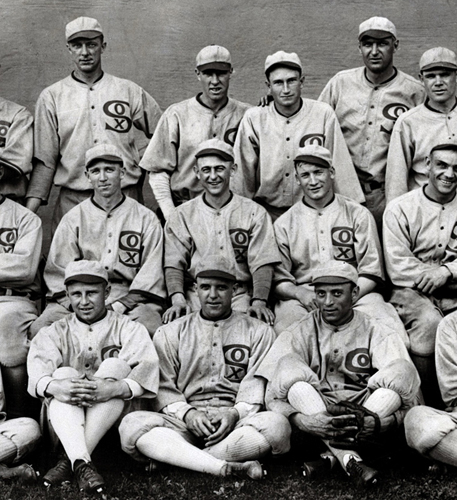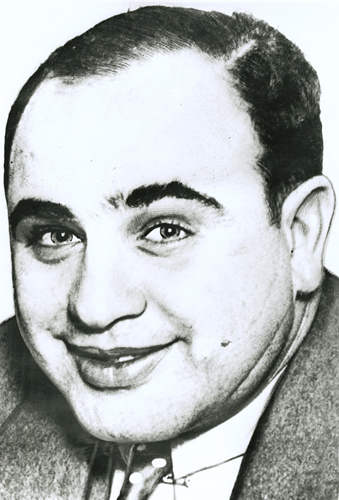1871: Great Chicago Fire Over
250 people died and 17,000 buildings were destroyed in this fire,
allegedly started by a cow kicking over a lantern. Just a few buildings
survived, including the Historic Water Tower and Pumping Station.

Great Chicago Fire of 1871
1885: First Skyscraper Though
just a measly – by today’s standards – nine stories, the Home Insurance
Building (now demolished) was the tallest of its time. William LeBarron
Jenney achieved this architectural feat by designing the first
weight-bearing steel frame. From then on, the only way was up. 1886: Haymarket Riot Wealthy
industrialists funded amazing Chicago arts institutions, but their
workers toiled long hours in abominable conditions. In May 1886, a labor
protest ended in an explosion at Haymarket Square that killed eight
policemen and two bystanders. Eight anarchists were convicted of murder,
though three were later pardoned for lack of evidence. 1892: First Elevated Train The
first train traveled just 3.6 miles (5.8 km) along tracks built above
city-owned alleys, (avoiding the need to negotiate with private property
owners). By 1893, the line was extended to Jackson Park to transport visitors to the World’s Columbian Exposition . 1900: Reversal of the Chicago River With
sewage flowing downriver to Lake Michigan, the source of the city’s
drinking water, thousands of Chicagoans were dying from the
contamination. To solve the problem, engineers created a canal that
forced the river to flow away from the lake: an extraordinary feat of
modern engineering. 1919: Chicago Black Sox Scandal The
Chicago White Sox was a winning baseball team but poorly paid, so
players sometimes fixed games, pocketing money from gamblers. After a
group of players conspired to lose the 1919 World Series, eight of them
were indicted, acquitted for insufficient evidence, but banned for life
from baseball – and forever nicknamed the “Black Sox.”

The Chicago White Sox in 1919
1929: Valentine’s Day Massacre This
brutal murder of seven of Al Capone’s rival gangsters is one of
history’s most notorious massacres. Capone set up a sting that sent
George “Bugsy” Moran’s main men to a nearby garage. There, Capone’s
henchmen, dressed as police officers, lined them up and riddled them
with bullets. Seven bushes now mark the spot (at Clark Street and
Dickens Avenue).

Al Capone
1942: First atom split Under the football stands on the campus of the University of Chicago
Enrico Fermi made history. He supervised the creation of a primitive
nuclear reactor and took the first major step in understanding how to
build an atomic bomb. 1955: First McDonald’s franchise opens Ray
Kroc, a milkshake mixer salesman, changed diets worldwide by convincing
Dick and Mac McDonald’s to franchise their San Bernadino, California
burger stand. The original restaurant in Des Plaines – 15 miles (24 km)
west of Chicago – is now a museum. 1983: Harold Washington elected Mayor Chicago’s
first African-American Mayor, Washington tragically died of a heart
attack shortly into his second term. His accomplishments included the
expansion of O’Hare International Airport and the creation of a new
central library .
Top 10 Residents
Jean Baptiste Point du Sable Chicago’s first non-native settler was an African-American trader who set up camp around 1779. Jane Addams This social activist (1860–1935) founded Hull House social center and won a Nobel Peace Prize. Carl Sandburg One of Chicago’s nicknames “City of big shoulders,” was penned by this author/poet (1878–1967). Al Capone America’s best-known mobster (1899–1947) was Chicago’s “Public Enemy Number One” until jailed in 1931 for tax evasion. Ernest Hemingway Born in Oak Park, this hard-living author (1899–1947) left the suburb of “wide lawns and narrow minds” at age 19. Richard J. Daley This effective, if corrupt, Chicago mayor (1902–76) served longer than any other. Benny Goodman Born to poor Russian-Jewish immigrants, jazz great Goodman (1909–86) earned the title “King of Swing.” Hugh Hefner Lothario and founder of Playboy (1926–), whose first issue sold over 50,000 copies. Curtis Mayfield Soul musician and social activist (1942–99), Mayfield had his first hit For Your Precious Love at age 17. Oprah Winfrey TV’s talk-show darling (1954–) has filmed in Chicago since 1984 and become an honorary native of the city.
|